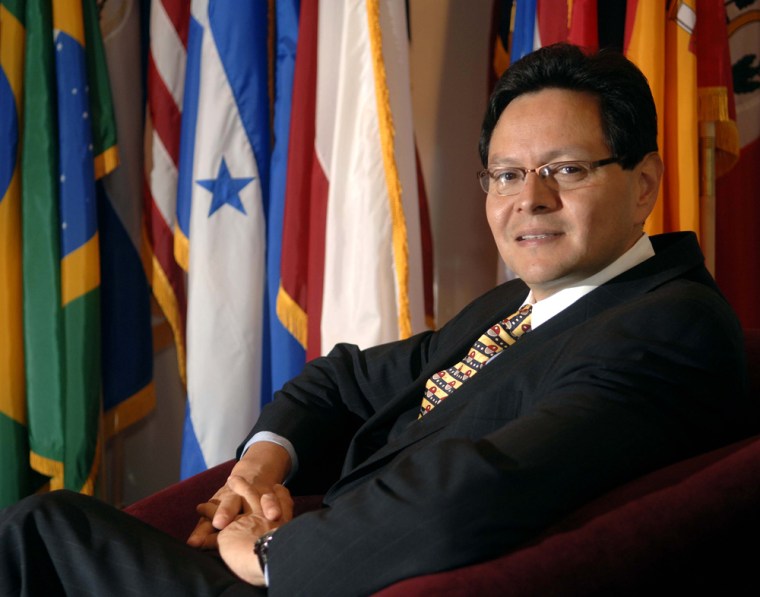It is both a time of promise and conflict for Hispanic-owned businesses.
The number of Hispanic-owned companies grew three times faster than the national average from 1997 to 2002, according to the latest figures from the U.S. Census Bureau. But as Hispanic entrepreneurs accumulate wealth, they come face to face with the issue of illegal immigration as several cities pass or introduce laws that will penalize companies that hire these workers.
The Associated Press discussed these issues with Michael Barrera, the president and chief executive of the U.S. Hispanic Chamber of Commerce, which has about 200 chambers of commerce members in the U.S., Canada, Puerto Rico and Mexico. The chamber will hold its annual convention this year in Philadelphia, from Sept. 20 to 23.
AP: What do you think accounts for the rapid growth of Hispanic-owned businesses in the U.S.?
Barrera: It's commensurate with the growth of the Latino market generally. Selig (Center) just came out with a study: The Hispanic market will be spending $800 billion this year. You need businesses to support that voracious appetite of consumer spending.
AP: What are the emerging business opportunities for Hispanic companies?
Barrera: Some of the emerging opportunities are in IT (information technology), and then you also look at financial services. With the passing of Cafta (Central America Free Trade Agreement) ... there are tremendous opportunities for Latino owned businesses (abroad).
When I traveled to Mexico this year ... they used to talk about how do we get people to invest in Mexico. The last two times I was there, they want to know how to do business with Latino-owned businesses here. It's not just Mexico, it's all Latin America.
AP: What is the most pressing challenge facing Hispanic businesses today?
Barrera: Access to capital. ... The Small Business Administration has been a great partner in providing a lot of our startup loans for our businesses, but it's more than that. We have to start looking at joint ventures, venture capital and those types of loan programs.
Also, IT is still a challenge. We're a little behind the rest of the market in IT.
AP: Illegal immigration has grabbed the headlines in recent months. What's the chamber's stance on the issue?
Barrera: We want comprehensive immigration — and that means many things. We don't want just enforcement because it's not good for business, it's not good for those 12 million (undocumented) people that are here. ... At the same time, we also recognize we have to have secure borders. ... But it's more than that.
Illegal immigration and a comprehensive policy will help our impending Social Security crisis. ... The Latino market is a very young market, particularly the immigrants. If you have this young market that's doing the work a lot of workers won't do, and contributing and adding to Social Security, that will help a lot of things.
AP: A number of cities have passed or are considering laws to make it tougher for illegal immigrants to find work in America. Businesses can face fines if they hire an illegal. What's the impact of such an environment on Hispanic-owned businesses?
Barrera: They want to follow the law and do the right thing but these laws have got to make sense. ... We want to be sure there is a proper guest worker program that has a proper identification card, which any small business can check without too much regulatory hassle in it.
AP: What kind of immigration policy would Hispanic businesses like to see?
Barrera: We do want to be sure that we know who's in this country. Let's identify the folks that are here. Let's have a legal pathway for workers that we need.
First, we've got to offer these jobs to American workers. If they don't want them, we have to have access to a workforce that can fulfill these jobs.
AP: Why do you think there's been such a backlash on illegal immigration recently?
Barrera: It's kind of interesting. At this time last year, this was not a big issue. I don't remember it being a big issue. I really believe someone saw it as a political issue.
It's gotten a lot of press and you've basically only seen one side of the argument if you turn on any TV. You always see people climbing over fences. They don't show the positive contributions that immigrants have made.
The perception of it right now is, it's a bunch of evil people coming over.
Bear Stearns did a recent study (showing) that there's an underground economy worth $970 billion. Most of that economy is fueled by illegal immigrants. If we're able to bring that shadow economy into the normal economy, look at the taxes we would capture. Just the taxes on that alone could almost wipe out our federal debt.
You have to look at this thing very objectively — what's best for the American economy and America.
